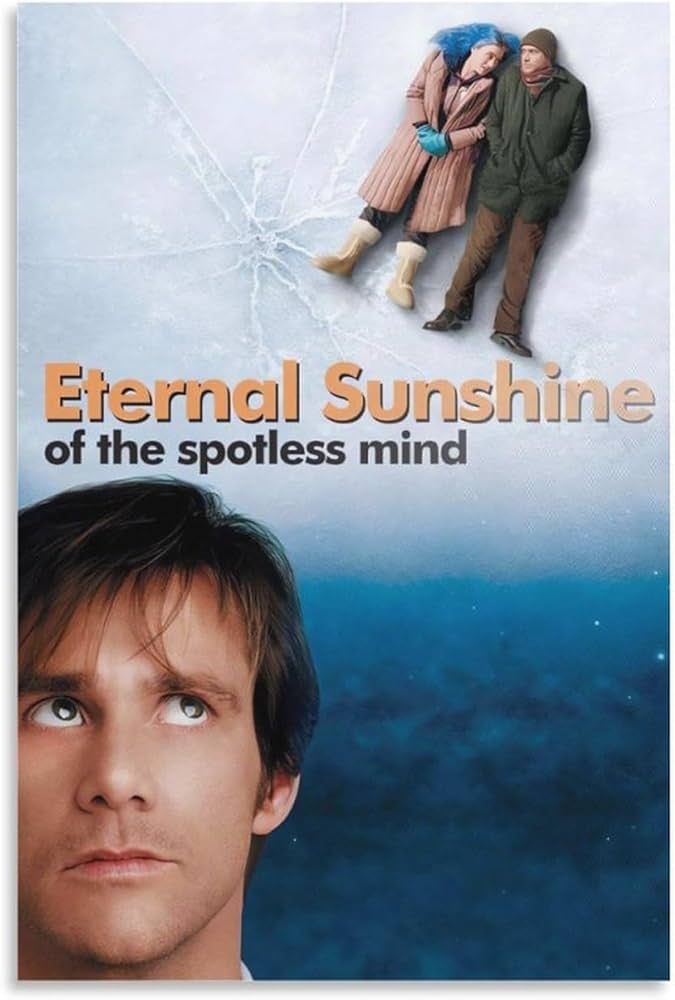
Eternal Sunshine of the Spotless Mind
Ah yes, Eternal Sunshine of the Spotless Mind, or as I like to call it, What If Breakups Were Even More Emotionally Devastating and Science Made It Worse? Michel Gondry and Charlie Kaufman basically took the universal human experience of heartbreak, ran it through a surrealist blender, and served it up as one of the most painfully beautiful movies ever made. This isn’t your typical rom-com where two quirky people bicker, break up, and then dramatically run through an airport to find each other again. No, this is what happens after the rom-com magic wears off, when love isn’t cute anymore, and the person you once adored now just reminds you of all your worst decisions.
Jim Carrey, in a move that shocked everyone who only knew him as “the guy who talks out of his butt in Ace Ventura,” plays Joel, a sad, introverted man who learns that his impulsive, free-spirited ex-girlfriend Clementine (Kate Winslet in her most chaotic form) has erased him from her memory using a weirdly casual brain procedure. Naturally, like any emotionally wounded man with access to experimental science, he decides to erase her too. But because Kaufman is a diabolical genius, we don’t just watch Joel go through the process—we watch his memories collapse in real time, a dreamlike rollercoaster where moments of love and pain literally melt away as he runs through his own mind, desperately trying to hold on to Clementine even as she disappears before his eyes.
And let’s talk about Winslet’s Clementine for a second, because she’s the ultimate manic pixie dream grenade. She’s not here to “fix” Joel—if anything, she’s just as lost as he is, if not more. She drinks too much, changes her hair color like it’s a mood ring, and makes impulsive decisions she regrets almost immediately. But she’s also brutally honest in a way that cuts through Joel’s passive existence like a knife. “Too many guys think I’m a concept, or I complete them, or I’m gonna make them alive,” she tells him in one of the movie’s many gut-punching moments. “But I’m just a fucked-up girl who’s looking for my own peace of mind.” That’s the magic of Eternal Sunshine—it doesn’t romanticize love; it unpacks it, deconstructs it, and reminds you that even the most passionate relationships come with baggage, misunderstandings, and heartbreak.
But what really elevates the film is how it turns the inside of Joel’s head into a surrealist funhouse of memories. The cinematography and practical effects make you feel like you’re inside his unraveling mind—books lose their words, faces blur, childhood memories bleed into romantic moments, and the world literally collapses around him. It’s beautiful and terrifying all at once, a visual representation of what it feels like to lose something you didn’t realize you wanted to keep until it was too late.
And yet, for all its existential dread, the film never fully sinks into cynicism. Because as much as it’s about heartbreak, it’s also about the inevitability of love. Even after all the pain, even after wiping each other from their minds, Joel and Clementine still find their way back together. The movie doesn’t promise a happy ending—it just suggests that love, in all its messy, flawed, heartbreaking glory, is worth the risk. And that’s what makes it such a masterpiece.
So yeah, Eternal Sunshine of the Spotless Mind is less of a movie and more of an emotional lobotomy in the best possible way. It’s the kind of film that leaves you staring at the ceiling at 2 AM, reevaluating every relationship you’ve ever had, and resisting the urge to text your ex. And honestly, what more could you ask for?